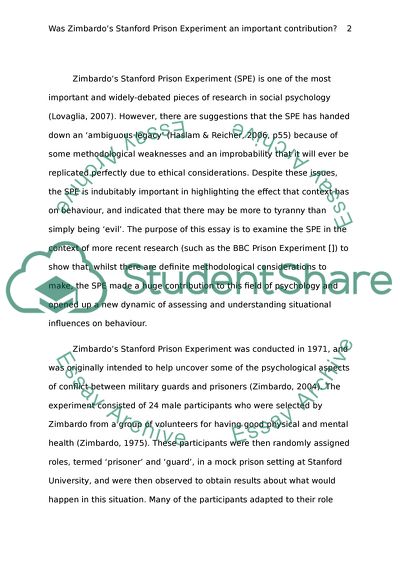Cite this document
(Zimbardos Stanford Prison Experiment Report Example | Topics and Well Written Essays - 1500 words, n.d.)
Zimbardos Stanford Prison Experiment Report Example | Topics and Well Written Essays - 1500 words. https://studentshare.org/psychology/1785167-was-zimbardos-stanford-prison-experiment-an-important-contribution-to-the-understanding-of-situational-influences-on-behaviour-or-an-experiment-fatally-flawed-by-methodological-weaknesses
Zimbardos Stanford Prison Experiment Report Example | Topics and Well Written Essays - 1500 words. https://studentshare.org/psychology/1785167-was-zimbardos-stanford-prison-experiment-an-important-contribution-to-the-understanding-of-situational-influences-on-behaviour-or-an-experiment-fatally-flawed-by-methodological-weaknesses
(Zimbardos Stanford Prison Experiment Report Example | Topics and Well Written Essays - 1500 Words)
Zimbardos Stanford Prison Experiment Report Example | Topics and Well Written Essays - 1500 Words. https://studentshare.org/psychology/1785167-was-zimbardos-stanford-prison-experiment-an-important-contribution-to-the-understanding-of-situational-influences-on-behaviour-or-an-experiment-fatally-flawed-by-methodological-weaknesses.
Zimbardos Stanford Prison Experiment Report Example | Topics and Well Written Essays - 1500 Words. https://studentshare.org/psychology/1785167-was-zimbardos-stanford-prison-experiment-an-important-contribution-to-the-understanding-of-situational-influences-on-behaviour-or-an-experiment-fatally-flawed-by-methodological-weaknesses.
“Zimbardos Stanford Prison Experiment Report Example | Topics and Well Written Essays - 1500 Words”. https://studentshare.org/psychology/1785167-was-zimbardos-stanford-prison-experiment-an-important-contribution-to-the-understanding-of-situational-influences-on-behaviour-or-an-experiment-fatally-flawed-by-methodological-weaknesses.


